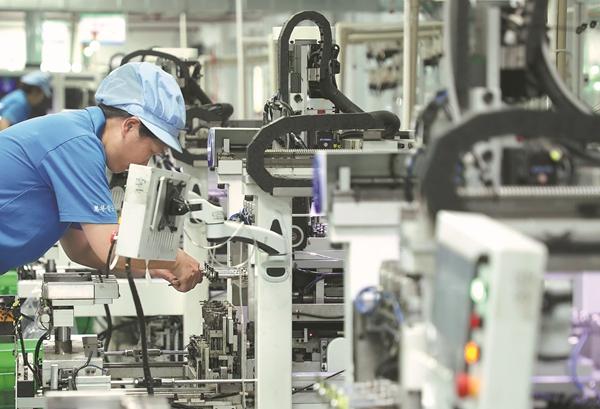Industrial economy to get fresh boost
 0 Comment(s)
0 Comment(s) Print
Print E-mail China Daily, July 20, 2023
E-mail China Daily, July 20, 2023

Employees work on the production line of an electronics company in Zixing, Hunan province. [Photo/China Daily]
China's top industry regulator said on Wednesday it will accelerate the implementation of policies to promote consumption in industries like automobiles and home appliances.
It will also draft new measures to fuel growth in 10 key industries, including electronics and steel.
China has been striving to buoy the recovery of its sprawling industrial economy, which is picking up pace amid a steady rebound in domestic demand despite external uncertainties.
China's industrial output, a gauge of activity in manufacturing, mining and utilities, grew 4.4 percent year-on-year in June after a 3.5 percent rise in May, the National Bureau of Statistics said.
Zhao Zhiguo, spokesman and chief engineer at the Ministry of Industry and Information Technology, said despite difficulties like insufficient demand and declining profits, the fundamentals of China's industrial development and the trend of macroeconomic recovery and improvement have not changed.
The ministry will step up efforts to promote purchases of new energy vehicles, smart home appliances and green building materials in the countryside, and accelerate the development of medical equipment, aviation, yachts and other industries, Zhao said.
"We will partner with the China Development Bank to implement special loan programs to increase investment in manufacturing. Meanwhile, we will encourage companies to explore markets in countries and regions taking part in the Belt and Road Initiative and consolidate the export of industrial products."
Since the beginning of this year, China's industrial economy has maintained a recovery and positive development trend. In the first half, industrial output grew 3.8 percent year-on-year, 0.4 percentage point and 0.8 percentage point faster, respectively, compared to a year earlier and the first quarter of this year.
As the backbone of the manufacturing sector, the equipment manufacturing segment has maintained a steady development momentum. Automotive, electrical machinery and equipment manufacturing have maintained high profit growth, Zhao said.
NBS data showed the output of semiconductor equipment manufacturing jumped nearly 31 percent year-on-year, while that of electronic components and mechanical equipment manufacturing rose 46.5 percent in the first half of this year.
Ye Yindan, a researcher at the BOC Research Institute, said going forward, the industrial economy will maintain a good recovery momentum on the back of the sustained rebound in domestic demand, which is expected to offset the pressure of falling external demand and become the main force to drive production.
Meanwhile, the government is expected to maintain policy support, which will continuously restore the confidence of small and medium-sized enterprises, and improve market expectations, Ye said.
It is important to adjust policy priorities in a timely fashion based on economic recovery, Ye said, underlining support for the development of newly established enterprises in the form of tax incentives and financial support, and encouragement for State-owned enterprises to postpone the collection of rent from newly established enterprises.
Meanwhile, more efforts are needed to provide policy support and other kinds of assistance to manufacturers and bolster their digital and intelligent transformation, experts said.
Wei Qijia, head of industrial economy research at the State Information Center, said manufacturing is important to China's economic growth. It is necessary to combine the expansion of domestic demand with the stabilization of external demand, so as to overcome challenges in a better way.
Yang Yuanqing, chairman and CEO of Lenovo Group Ltd, the world's largest personal computer maker, said China's efforts to support the private sector and implement favorable industrial and financial policies are giving companies more confidence.
"We aim to grow our personal computer business at a growth rate that outpaces overall industry growth and maintain industry-leading profitability in the new fiscal year," Yang said.





